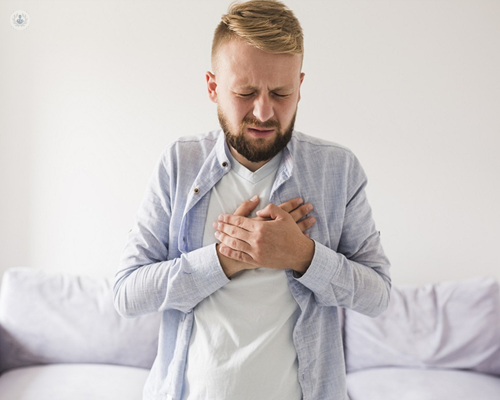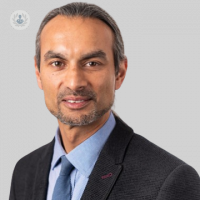Chest pain and when you need to see a cardiologist
Autore:
Chest pain should never be ignored, as it can be a sign of a serious heart condition. Early diagnosis and treatment are crucial in preventing complications and improving outcomes. Here to detail when you need to see a cardiologist for chest pain is leading consultant cardiologist Dr Ramesh de Silva.

What causes chest pain?
Chest pain can stem from various causes, some of which are not related to the heart. Common causes include muscle strain, gastrointestinal issues such as acid reflux and respiratory conditions like pneumonia. However, chest pain can also indicate more serious conditions such as angina, heart attack or other cardiovascular problems.
When is chest pain a sign of a heart problem?
Chest pain related to heart problems often presents in specific ways. If you experience a heavy, tight or squeezing pain in the centre or left side of your chest, it could be a sign of angina or a heart attack. This pain may spread to your shoulders, arms, neck, jaw or back. Other accompanying symptoms may include shortness of breath, sweating, nausea and dizziness. If chest pain is sudden, severe or accompanied by these symptoms, it is crucial to seek medical attention immediately.
What are the risks of ignoring chest pain?
Ignoring chest pain can have serious consequences, especially if it's related to a heart condition. Delaying medical evaluation and treatment for chest pain caused by a heart attack or other serious heart problems can lead to permanent heart damage or even death. It is always better to err on the side of caution and consult a healthcare professional if you experience chest pain, particularly if it is severe or persistent.
When should you see a cardiologist for chest pain?
You should see a cardiologist if you experience recurrent chest pain, especially if it occurs during physical activity, stress or after eating. If the pain is accompanied by other symptoms such as shortness of breath, fainting or palpitations, it’s important to seek medical advice. Additionally, if you have risk factors for heart disease, such as high blood pressure, high cholesterol, diabetes, smoking or a family history of heart disease, you should consult a cardiologist to evaluate your symptoms.
How is chest pain diagnosed?
To diagnose the cause of chest pain, a cardiologist will start with a detailed medical history and physical examination. They may order various tests, including:
Electrocardiogram (ECG)
This test records the electrical activity of the heart and can help identify abnormalities such as heart attacks or arrhythmias.
Blood tests
Certain enzymes and proteins released during a heart attack can be detected through blood tests.
Chest X-ray
This can help rule out other causes of chest pain, such as lung conditions.
Stress test
This test assesses how the heart functions under physical stress, which can reveal issues not apparent at rest.
Echocardiogram
An ultrasound of the heart that provides detailed images of its structure and function.
Coronary angiography
This imaging test uses dye and X-rays to visualise the coronary arteries and identify blockages.
What are the treatment options for chest pain?
The treatment for chest pain depends on its underlying cause. If the pain is related to heart disease, treatments may include lifestyle changes, medications and potentially procedures or surgery. Medications can include nitrates to relieve angina, antiplatelet drugs to prevent clotting, and beta-blockers to reduce heart strain. In more severe cases, procedures such as angioplasty and stenting, or coronary artery bypass surgery, may be necessary.
How can you prevent heart-related chest pain?
Preventing heart-related chest pain involves managing risk factors for heart disease. This includes maintaining a healthy diet, engaging in regular physical activity, avoiding smoking, and controlling conditions such as high blood pressure, high cholesterol and diabetes. Regular check-ups with a healthcare provider and adherence to prescribed treatments are also essential in preventing heart-related chest pain.
If you experience chest pain, particularly if it is severe or recurrent, consult a cardiologist to determine the cause and appropriate treatment.
Concerned about chest pain? Arrange a consultation with Dr de Silva via his Top Doctors profile.


